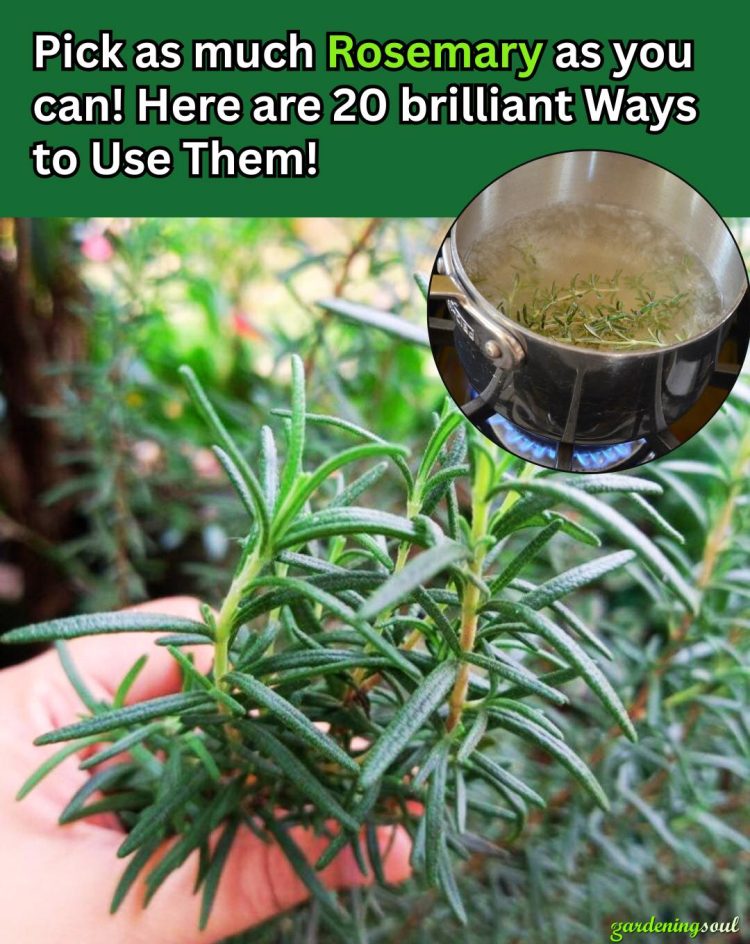How to Plant It:
Space bushes 18 inches apart.
Trim regularly for dense growth.
17. Make Rosemary-Infused Honey
Rosemary-infused honey combines the sweetness of honey with the earthy, herbal aroma of rosemary, making it a powerful superfood with antibacterial and anti-inflammatory properties.
It’s perfect for soothing sore throats, boosting immunity, and adding a gourmet touch to various dishes.
How to Make Rosemary Honey:
Heat 1 cup of raw honey in a small saucepan on low heat. Don’t let it boil!
Add 3-4 fresh rosemary sprigs (or dried rosemary).
Let the honey infuse for 10-15 minutes, stirring occasionally.
Remove from heat and let it sit for 1-2 hours to develop flavor.
Strain out the rosemary sprigs and pour the honey into a glass jar.
How to Use It:
Drizzle on toast, pancakes, or waffles.
Stir into tea or warm water for an immune-boosting drink.
Use in salad dressings or marinades.
Add to baked goods for an extra layer of flavor.
18. Use Rosemary Stems as Skewers for Grilling
Instead of using wooden or metal skewers, try using rosemary stems! The woody stems of rosemary infuse grilled meats, vegetables, and seafood with a rich, smoky, herbal aroma that takes your barbecue to the next level.
How to Make Rosemary Skewers:
Choose thick, woody rosemary stems (about 8-10 inches long).
Strip most of the leaves, leaving only a small amount at the top for decoration.
Soak the stems in water for 30 minutes to prevent burning.
Thread your meat, seafood, or vegetables onto the rosemary skewers.
Grill over medium heat, turning occasionally, until fully cooked.
Extra Tip: Use the stripped rosemary leaves to season your meat or sprinkle over grilled dishes for extra flavor.
19. Make Homemade Rosemary Soap
Making rosemary soap is a fun, chemical-free way to create a refreshing, natural antibacterial cleanser for your skin.
Rosemary has antiseptic and antimicrobial properties, making it great for acne-prone skin, soothing inflammation, and balancing oil production.
How to Make Homemade Rosemary Soap:
Option 1: Quick & Easy Melt-and-Pour Rosemary Soap
Melt ½ pound of glycerin soap base in a double boiler.
Add 1 tbsp dried rosemary leaves and 10 drops rosemary essential oil.
Stir well and pour into soap molds.
Let cool for 4 hours, then pop out and use!
Option 2: Traditional Cold-Process Rosemary Soap
In a well-ventilated area, combine 10 oz of coconut oil, 10 oz of olive oil, and 5 oz of lye.
Slowly mix the lye solution into the oils and blend until it reaches “trace” (thick pudding consistency).
Stir in 2 tbsp finely chopped rosemary and 10 drops rosemary essential oil.
Pour into a soap mold and let cure for 4-6 weeks.
Extra Tip: Add oatmeal or honey for a moisturizing boost!
20. Add Rosemary to Homemade Cleaning Sprays
Rosemary has antibacterial, antifungal, and antiviral properties, making it a natural cleaner that eliminates germs without harsh chemicals. The fresh, herbal scent also naturally deodorizes your home.
How to Make a DIY Rosemary Cleaning Spray:
Fill a glass spray bottle with white vinegar (or rubbing alcohol for a stronger disinfectant).
Add 2-3 fresh rosemary sprigs.
Optional: Add lemon peels or lavender for extra fragrance.
Let sit for 1-2 weeks so the rosemary infuses into the solution.
Strain out the rosemary and pour the liquid into a clean bottle.
How to Use It:
Spray on kitchen counters, stovetops, and sinks.
Use as a bathroom disinfectant (perfect for mirrors & tiles).
Mist in rooms for a natural air freshener.
A rosemary bush is a kitchen staple, natural remedy, and home essential.
With endless uses, growing your own saves money, enhances your garden, and promotes well-being.
